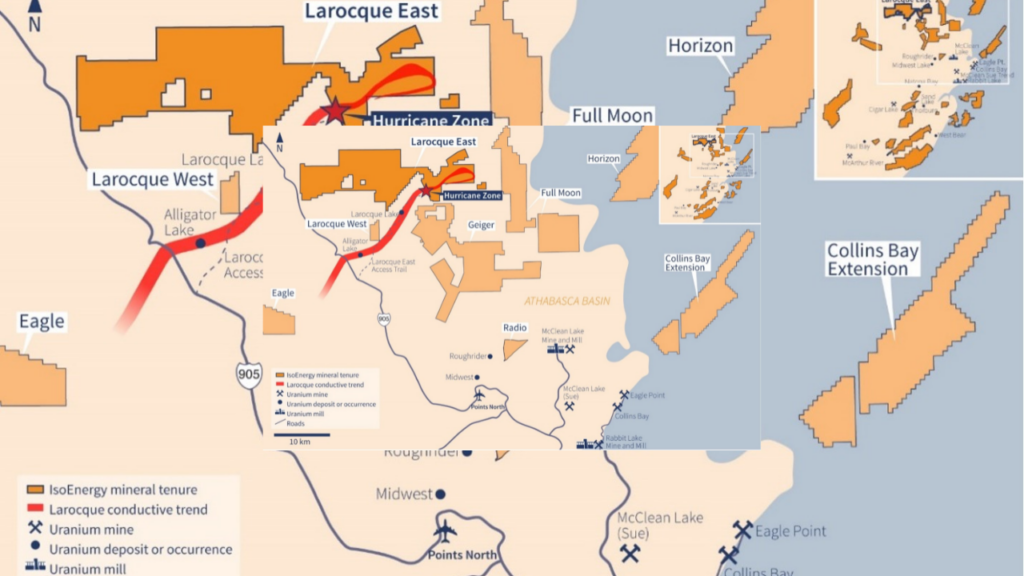Vancouver, BC – IsoEnergy Ltd. (“IsoEnergy” or the “Company”) (TSX-V: ISO | OTCQX: ISENF) is pleased to announce the remaining scintillometer results from its successful summer drilling at the Hurricane zone. Hurricane is a high-grade uranium project located on the Company’s 100% owned Larocque East property (the “Property”) in the Eastern Athabasca Basin of Saskatchewan. 2021 drilling at Hurricane has now concluded and planning is underway for the follow-up program early in 2022.
Highlights:
- Expansion of the mineralized footprint 31m to the south on Section 4485E and 17m to the south on Section 4460E
- Discovery of a new zone of strong mineralization south of the strongly mineralized zone defined in 2020
- Identification by drill hole LE21-101 of an area with potential for continued growth south and east of known mineralization
Tim Gabruch, President and Chief Executive Officer commented: “We are pleased that our summer drilling program at Larocque East has been safely and successfully completed. Drilling at Hurricane continued to grow the zone of uranium mineralization in line with our objectives and strategy. Given these scintillometer results, combined with the program’s initial results released in September 2021, it has been a successful drilling campaign, and we look forward to the winter program commencing in January 2022 to test further potential. Additionally, we have begun to receive some assay results, which we expect to release shortly. It is anticipated that the balance of the assay results will be received before the end of December.”
Andy Carmichael, Vice President of Exploration commented: “The team has had continued success expanding the western side of the Hurricane zone to the south. As well, the identification of an area in the immediate vicinity of Hurricane (drill hole LE21-101) with potential for continued growth is encouraging and we look forward to commencing our next program.”
Note: Radioactivity is total gamma counts per second (CPS) from drill core measured with an RS-125 hand-held spectrometer (RS-125).
Southerly Expansion
LE21-107 (Section 4485E)
LE21-107 targeted the centre of a 26m gap between previously reported drill holes LE20-71 (2.4% U3O8 over 2.0m) and LE21-82 (4.5m >500 CPS including 1.0m >5,000 CPS). LE21-107 intersected 6.5m of uranium mineralization (>500 CPS) from 325.5 to 332.0m, including 3.5m of strong mineralization (>30,000 CPS) from 327.5 to 331.0m. Figures 2 and 3 show the location of the drill hole in plan and section view, respectively.
LE21-103 (Section 4485E)
Drill hole LE21-103 targeted the unconformity 31m south of previously reported drill hole LE21-82. LE21-103 intersected 4.0m of uranium mineralization (500 CPS) from 334.5m to 338.5m which includes 0.5m >5,000 CPS from 337.5 to 338.0m. The results of LE21-103 expand the Hurricane zone 31m to the south and the mineralized footprint is now at least 125m wide on section 4485E. Figures 2 and 3 show the drill hole in plan and section view, respectively.
LE21-87A (Section 4460E)
Drill hole LE21-87A was completed 17m south of previously reported drill hole LE21-78C1 (12.0m averaging >500 CPS including 2.0m >30,000 CPS). LE21-87A intersected 7.5m of uranium mineralization (>500 CPS) from 331.0m to 338.5m, including 2.0m of mineralization exceeding 20,000 CPS from 336.0m to 338.0m and including 1.0m exceeding 20,000 CPS from 334.0 to 335.0m. The mineralization in LE21-87A has expanded the Hurricane zone 17m to the south and the mineralized footprint is now at least 86m wide on section 4460E. Figures 2 and 4 show the location of the drill hole in plan and section view, respectively.
2021 drill holes LE21-87A, LE21-107 and LE21-78C1 define a new zone of strong mineralization located immediately south of the strongly mineralized zone discovered in 2020 (Figure 2).
LE21-91 (Section 4510E)
Drill hole LE21-91 was completed to test for easterly extensions of mineralization intersected by earlier 2021 drill holes, targeting the unconformity 28m northeast of LE21-82 and 47m east of LE21-78C1. LE21-91 intersected 5.0m of uranium mineralization (>500 CPS) from 336.0m to 341.0m. Two 0.5m subintervals >5,000 CPS were intersected; an upper zone from 337.5 to 338.0m, and a lower zone from 338.5 to 339.0m. Figures 2 and 5 show the drill hole location in plan and section view, respectively.
LE21-105 (Section 4535E)
Drill hole LE21-105 was completed to test for easterly extensions of mineralization intersected by LE21-91. LE21-105 reached the unconformity 21m east of LE21-91 at a depth of 341.5m, intersecting 0.5m of uranium mineralization (>500 CPS) from 339.5 to 340.0m. Figure 2 shows the drill hole in plan view.
Continued Growth Potential
LE21-101 (Section 4785E)
Drill hole LE21-101 tested the unconformity in an area where graphitic basement bounded by the J- and L-Faults has seen limited drilling. LE21-101 intersected 4.5m of uranium mineralization (>500 CPS) from 324.5 to 329.0m including 0.5m >5,000 CPS from 327.5 to 328.0m. These results are considered encouraging as the unconformity along this prospective, graphitic structural corridor is untested to the east and the nearest drill hole along strike to the west is 150m away. Figures 2 and 6 show the drill hole in plan and section view, respectively.
LE21-89 and LE21-95A (Section 4885E)
Drill holes LE21-89 and LE21-95A were completed on section 4885E in the centre of a 200m along-strike gap in drilling. LE21-89 targeted the I-fault at the unconformity and located the J- and K-faults at depth. LE21-95A targeted the K-fault at the unconformity. Neither drill hole intersected uranium mineralization. Significantly, LE21-95A is interpreted to have undershot the K-fault by 25m indicating the mineralization intersected by LE21-101 remains open to the east. Figure 2 shows the locations of drill holes LE21-89 and LE21-95A in plan view.
Defining the Zone
LE21-85 (Section 4460E)
Drill hole LE21-85 was drilled to follow up mineralization intersected by previously reported drill holes LE20-57 (11.7% U3O8 over 10.0m) and LE20-38 (2.0% U3O8 over 7.5m). LE21-85 intersected two zones of weak uranium mineralization (>500 CPS) comprising a 1.0m long upper zone from 321.5 to 322.5m and a 0.5m long lower zone from 327.0m to 327.5m. Figures 2 and 4 show the location of the drill hole in plan and section view, respectively.
LE21-100 (Section 4635E)
Drill hole LE21-100 was drilled to test for mineralization east of historical drill hole KER-11 (0.06% U3O8 over 0.5m). No mineralization was intersected. Figure 2 shows the drill hole location in plan view.
LE21-93 (Section 4435E) and LE21-97A (Section 4410E)
LE21-93 and LE21-97A were drilled to expand mineralization to the north on sections 4410E and 4435E, respectively. LE21-93 targeted the unconformity 29m north of previously reported drill hole LE20-42 (0.4% U3O8 over 3.0m) and intersected 0.5m of uranium mineralization (>500 CPS) 13m above the unconformity. LE21-97A targeted the unconformity 29m north of previously reported drill hole LE21-84 (3.0m >500 CPS); no mineralization was intersected by LE21-97A. Mineralization is interpreted to be closed off to the north on section 4435E and potential for continued northerly expansion on section 4410E is considered to be low. Figure 2 shows the location of drill holes LE21-93 and LE21-97A in plan view.
The Larocque East Property and the Hurricane Zone
The 100% owned Larocque East property consists of 33 mineral claims totaling 16,780ha. Two of the project’s claims distal to the Hurricane zone are subject to a 2% Net Smelter Returns Royalty of which 1% may be bought back for $1 million at IsoEnergy’s discretion. Larocque East is immediately adjacent to the north end of IsoEnergy’s Geiger property and is 35km northwest of Orano Canada’s McClean Lake uranium mine and mill.
Along with other target areas, the Larocque East Property covers a 15-kilometre-long northeast extension of the Larocque Lake conductor system; a trend of graphitic metasedimentary basement rocks that is associated with significant uranium mineralization at the Hurricane zone, and in several occurrences on Cameco Corp. and Orano Canada Inc.’s neighbouring property to the southwest of Larocque East. The Hurricane zone was discovered in July 2018 and was followed up with 29 drill holes in 2019 and an additional 48 drill holes in 2020. Dimensions are currently 375m along-strike, up to 125m wide, and up to 12m thick. The zone is open for expansion along-strike to the east and to the north and south on some sections. Mineralization is polymetallic and commonly straddles the sub-Athabasca unconformity 320 m below surface. The best intersection to date is 38.8% U3O8 over 7.5m in drill hole LE20-76. Drilling at Cameco Corp.’s Larocque Lake zone on the neighbouring property to the southwest has returned historical intersections of up to 29.9% U3O8 over 7.0m in drill hole Q22-040. Like the nearby Geiger property, Larocque East is located adjacent to the Wollaston-Mudjatik transition zone – a major crustal suture related to most of the uranium deposits in the eastern Athabasca Basin. Importantly, the sandstone cover on the Property is thin, ranging between 140m and 450m in previous drilling.
Table 1 – Summer 2021 Drilling Program Results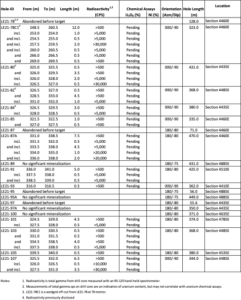
Figure 1 – Larocque East Property Map
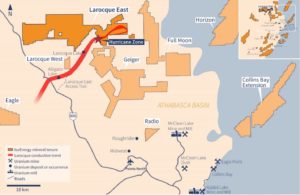
Figure 2 – Hurricane Zone Drill Hole Location Map
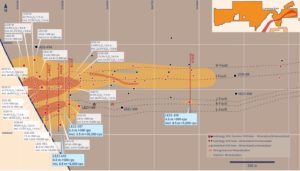
Figure 3 – Section 4485E
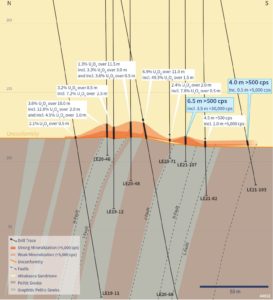
Figure 4 – Section 4460E
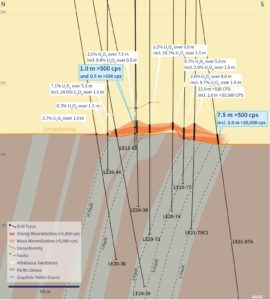
Figure 5 – Section 4510E
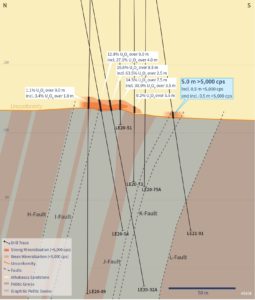
Figure 6 – Section 4785E
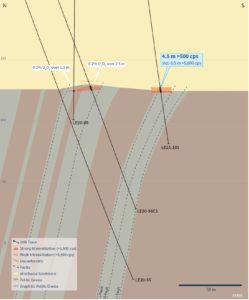
Qualified Person Statement
The scientific and technical information contained in this news release was prepared by Andy Carmichael, P.Geo., IsoEnergy’s Vice President, Exploration, who is a “Qualified Person” (as defined in NI 43-101 – Standards of Disclosure for Mineral Projects). Mr. Carmichael has verified the data disclosed. All radioactivity measurements reported herein are total gamma from an RS-125 hand-held spectrometer. As mineralized drill holes at the Hurricane zone are oriented very steeply (-70 to -90 degrees) into a zone of mineralization that is interpreted to be horizontal, the true thickness of the intersections is expected to be greater than or equal to 90% of the core lengths. This news release refers to properties other than those in which the Company has an interest. Mineralization on those other properties is not necessarily indicative of mineralization on the Company’s properties. All chemical analyses are completed for the Company by SRC Geoanalytical Laboratories in Saskatoon, SK. For additional information regarding the Company’s Larocque East Project, including its quality assurance and quality control procedures, please see the Technical Report dated effective May 15, 2019, on the Company’s profile at www.sedar.com.
About IsoEnergy
IsoEnergy is a well-funded uranium exploration and development company with a portfolio of prospective projects in the eastern Athabasca Basin in Saskatchewan, Canada. The Company recently discovered the high-grade Hurricane Zone of uranium mineralization on its 100% owned Larocque East property in the Eastern Athabasca Basin. IsoEnergy is led by a Board and Management team with a track record of success in uranium exploration, development, and operations. The Company was founded and is supported by the team at its major shareholder, NexGen Energy Ltd.
Follow us on:
Twitter
LinkedIn
Tim Gabruch
President and Chief Executive Officer
IsoEnergy Ltd.
+1 306-261-6284
info@isoenergy.ca
www.isoenergy.ca
Investor Relations
Kin Communications
+1 604 684 6730
iso@kincommunications.com
Neither the TSX Venture Exchange nor its Regulations Services Provider (as that term is defined in the policies of the TSX Venture Exchange) accepts responsibility for the adequacy or accuracy of this release.
This news release shall not constitute an offer to sell or a solicitation of any offer to buy any securities, nor shall there be any sale of any securities in any jurisdiction in which such offer, solicitation or sale would be unlawful. The securities referenced herein have not been, nor will they be, registered under the United States Securities Act of 1933, as amended (the “U.S. Securities Act”), and such securities may not be offered or sold within the United States absent registration under the U.S. Securities Act or an applicable exemption from the registration requirements thereunder.
Forward-Looking Information
The information contained herein contains “forward-looking statements” within the meaning of the United States Private Securities Litigation Reform Act of 1995 and “forward-looking information” within the meaning of applicable Canadian securities legislation. “Forward-looking information” includes, but is not limited to, statements with respect to the activities, events or developments that the Company expects or anticipates will or may occur in the future, including, without limitation, planned exploration activities. Generally, but not always, forward-looking information and statements can be identified by the use of words such as “plans”, “expects”, “is expected”, “budget”, “scheduled”, “estimates”, “forecasts”, “intends”, “anticipates”, or “believes” or the negative connotation thereof or variations of such words and phrases or state that certain actions, events or results “may”, “could”, “would”, “might” or “will be taken”, “occur” or “be achieved” or the negative connotation thereof.
Such forward-looking information and statements are based on numerous assumptions, including among others, that the results of planned exploration activities are as anticipated, the price of uranium, the anticipated cost of planned exploration activities, that general business and economic conditions will not change in a material adverse manner, that financing will be available if and when needed and on reasonable terms, that third party contractors, equipment and supplies and governmental and other approvals required to conduct the Company’s planned exploration activities will be available on reasonable terms and in a timely manner. Although the assumptions made by the Company in providing forward-looking information or making forward-looking statements are considered reasonable by management at the time, there can be no assurance that such assumptions will prove to be accurate.
Forward-looking information and statements also involve known and unknown risks and uncertainties and other factors, which may cause actual events or results in future periods to differ materially from any projections of future events or results expressed or implied by such forward-looking information or statements, including, among others: negative operating cash flow and dependence on third party financing, uncertainty of additional financing, no known mineral reserves or resources, the limited operating history of the Company, the influence of a large shareholder, alternative sources of energy and uranium prices, aboriginal title and consultation issues, reliance on key management and other personnel, actual results of exploration activities being different than anticipated, changes in exploration programs based upon results, availability of third party contractors, availability of equipment and supplies, failure of equipment to operate as anticipated; accidents, effects of weather and other natural phenomena and other risks associated with the mineral exploration industry, environmental risks, changes in laws and regulations, community relations and delays in obtaining governmental or other approvals.
Although the Company has attempted to identify important factors that could cause actual results to differ materially from those contained in the forward-looking information or implied by forward-looking information, there may be other factors that cause results not to be as anticipated, estimated or intended. There can be no assurance that forward-looking information and statements will prove to be accurate, as actual results and future events could differ materially from those anticipated, estimated or intended. Accordingly, readers should not place undue reliance on forward-looking statements or information. The Company undertakes no obligation to update or reissue forward-looking information as a result of new information or events except as required by applicable securities laws

